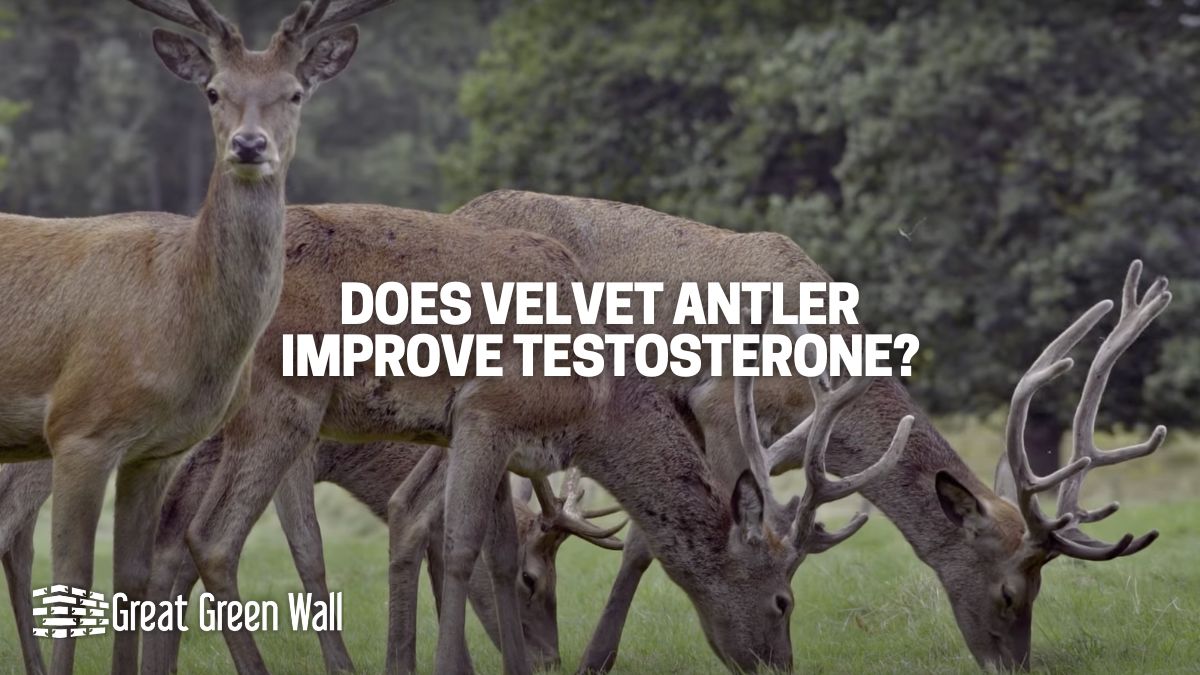Most men already know that Testosterone rates are plummeting among men around the world. There are a number of factors that go into this decline in T, and it seems like every day there are 10 “miracle cures” for every single cause of Low-T. Here at the Great Green Wall, we’re dedicated to providing you with the science behind proven products and ingredients–and we expose the fakes and fraudsters wherever we come across them.
So where does that leave us on an ancient remedy many people swear by, Velvet Antler? Let’s dive into what research has been done, and what the clinical data tell us.
What You Need to Know
Junk Science
One of the purposes of the Great Green Wall is to help steer people toward solid supplements and statistics based on facts, not fads. When we find something that looks like a scam, we point it out. A perfect example is Velvet Antler. If you or someone you know happens to have had luck with Velvet Antler, then we won’t dispute that. But based on all the science we could gather, at the end of the day – it doesn’t work.
Best Data Available
I’ve written before about the importance of certain things in a scientific study–randomized selection of participants, placebo-controls, etc. In evaluating how data are collected we can come to a better understanding of how good the data actually is.
Testosterone
Let’s start with studies versus humans and versus animals. It may sound simple, but the fact is that humans and animals process nutrients differently. Even animals we use all the time in place of humans.
The one study with T-Boosting effects from Antler was conducted on mice. It was quite effective, increasing Total T, StAR Protein expression, and other indicators of sexual health. But those results haven’t transferred to human participants.
For instance, in a 12 week, placebo-controlled study, there were no differences in men taking Velvet Antler or a sugar pill–no differences in hormone levels, or sexual behavior.
Another supposed hormonal benefit to Velvet Antler is Insulin-like Growth Factor-1, or IGF-1. It’s been demonstrated time and again by the most rigorous scientific study that IGF-1 can stimulate T-Production. And Velvet Antler has been noted for its extremely high levels of IGF-1. The only problem is that ingesting Antler doesn’t necessarily raise your levels of IGF-1.
In fact, a study of 28 University athletes put through extensive physiological testing and hormone assays found no IGF-1 increases after Antler use.
And even if Antler did promote IGF-1 in humans, this would prohibit you from participating in most sports–IGF-1 is banned by most sports governing agencies. Bottom line here is that Velvet Antler has only been seen to promote Testosterone in mice; it doesn’t improve any other hormone response; and the one thing it does contain is a banned substance that doesn’t make it into human bloodstreams anyway.
But what about all those claims that it can increase physical performance? Here we hit another pitfall, a total lack of good evidence.
Strength And Endurance
Take this study, for instance, in which a study of 32 men taking placebo or Velvet Antler were given strength tests, and the Velvet Antler group did better. Sounds good. But when we look further, we see that only 18 men completed the study, nine in each group. No explanation of why the other 14 men’s data aren’t accounted for.
Also, are we really going to put our faith in a study that showed promising results in only 9 men? On the other side we have a similar study, conducted on 16 men, with no positive results, and this study with 38 men whose results were so inconsistent they called for more research to avoid a false-positive result.
Final Verdict
I’ve mentioned before that there is some good wisdom to be gained from the crowd. As an example, if one were to ask all the best fighter pilots what they eat for breakfast and none of them mention a full English, then you could surmise that getting ready for a flight shouldn’t mean 23 grams of saturated fat.
I mention that because none of the best-performing T-Boosters have Deer Antler. Zero, nil, nada. And each of them has a unique formula, one tested and researched, including specific ingredients for their focused results. And none of them saw Velvet Antler as a worthwhile ingredient. That’s telling. And one thing it tells us is you should probably avoid Velvet Antler.

